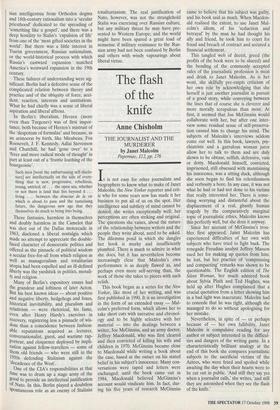The flash of the knife
Anne Chisholm
THE JOURNALIST AND THE MURDERER by Janet Malcolm Papermac, .E12, pp. 176 It is not easy for other journalists and biographers to know what to make of Janet Malcolm, the New Yorker reporter and crit- ic who for some years now has made it her business to put all of us on the spot. Her intelligence and subtlety of mind cannot be denied; she writes exceptionally well; her perceptions are often striking and original. The questions she raises, about the nature of the relationship between writers and the people they write about, need to be asked. The dilemma pond in which she dangles her hook is murky and insufficiently plumbed. There is much to admire in what she does, but it has nevertheless become increasingly clear that Malcolm's own performance is as deeply flawed as, and perhaps even more self-serving than, the work of those she takes to pieces with such relish.
This book began as a series for the New Yorker, like most of her writing, and was first published in 1990. It is an investigation in the form of an extended essay — Mal- colm's preferred form, which allows her to take short cuts with narrative and chronol- ogy and to be highly selective with her material — into the dealings between a writer, Joe McGinniss, and an army doctor, Jeffrey Macdonald, who was first cleared and then convicted of killing his wife and children in 1970. McGinniss became close to Macdonald while writing a book about the case, based at the outset on his stated belief in his subject's innocence. Many con- versations were taped and letters were exchanged; until the book came out in 1984, Macdonald believed McGinniss's account would vindicate him. In fact, dur- ing his five years of research McGinniss came to believe that his subject was guilty, and his book said as much. When Macdon- ald realised the extent, to use Janet Mal- colm's idiom, of his 'seduction and betrayal' by the man he had thought his ally and friend, he took him to court for fraud and breach of contract and secured a financial settlement.
This tangled web of deceit, greed (the profits of the book were to be shared) and the bending of the commonly accepted rules of the journalistic profession is meat and drink to Janet Malcolm. As is her wont, she skilfully pre-empts criticism of her own role by acknowledging that she herself is just another journalist in pursuit of a good story, while conveying between the lines that of course she is cleverer and more morally scrupulous than most. At first, it seemed that Joe McGinniss would collaborate with her, but after one inter- view some residual sense of self-preserva- tion caused him to change his mind. The subjects of Malcolm's interviews seldom come out well. In this book, lawyers, psy- chiatrists and a garrulous woman juror allow her to talk to them and are duly shown to be obtuse, selfish, defensive, vain or dotty. Macdonald himself, convicted, imprisoned, still obsessed with maintaining his innocence, was a sitting duck, although she soon began to find his relentlessness and verbosity a bore. In any case, it was not what he had or had not done to his victims that really interested her. There is some- thing worrying and distasteful about the displacement of a real, ghastly human tragedy by the comparatively marginal topic of journalistic ethics. Malcolm knows this perfectly well, but she does it anyway.
Since her account of McGinniss's trou- bles first appeared, Janet Malcolm has experienced difficulties of her own with subjects who have tried to fight back. The renegade Freudian analyst Jeffrey Masson sued her for making up quotes from him; he lost, but her practice of 'compressing and compacting' remarks was shown to be questionable. The English edition of The Silent Woman, her much admired book about Sylvia Plath and Ted Hughes, was held up after Hughes complained that a crucial quotation from a letter showing him in a bad light was inaccurate. Malcolm had to concede that he was right, although she managed to do so without apologising for her mistake.
Nevertheless, in spite of — or perhaps because of — her own fallibility, Janet Malcolm is compulsive reading for any author or subject interested in the difficul- ties and dangers of the writing game. In a characteristically brilliant analogy at the end of this book she compares journalistic subjects to the sacrificial victims of the Aztecs, who were feted and spoiled while awaiting the day when their hearts were to be cut out in public. 'And still they say yes when a journalist calls,' she writes, 'and still they are astonished when they see the flash of the knife.'










































































 Previous page
Previous page